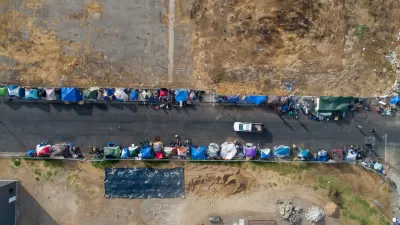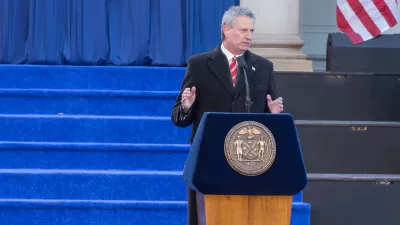A new study conducted by former Boston Mayor Tom Menino and the Initiative on Cities at Boston University surveyed 70 mayors on their challenges, policy agendas, and relationships.
During his 20 year tenure as mayor of Boston, Tom Menino chatted with many different mayors on their experiences in city government. Driven by these conversations, Menino spearheaded a nationally representative study of American mayors on policy priorities and challenges, controlling for city size and political party.
Often seen as more nimble than federal bureaucrats, mayors are cited as not letting partisan politics influence their policies. Despite this, as Alexis Stephens of Next City discusses, there are key differences between Republican and Democratic mayors in this study.
In general, mayors cited aging infrastructure and fiscal, budgeting concerns as their top two challenges. However, as Stephens writes: "Breaking down the same answers by political affiliation exposes a divide on priorities... with Republican mayors emphasizing 'economic development' challenges, and financial management at the head of the list for Democratic mayors."
Overwhelmingly, the most obvious policy discrepancies between Democratic and Republican mayors were more ideological. "The surveyors also asked the mayors whether the government should try to close the gap between rich and poor, even if it came at the expense of businesses and/or the affluent. Republican mayors overwhelmingly were opposed (almost 90 percent), while more than half of the Democrats agreed with the tradeoff approach... This might have to do with the different challenges, particularly fiscal, that Democratic mayors are facing."
With regard to economic health, the study also found that mayors from poorer cities were more likely to "support gentrification"— an increase in property values even at the expense of displacing the city's poor— than mayors of wealthier cities.
FULL STORY: What Keeps U.S. Mayors Awake at Night?

Trump Administration Could Effectively End Housing Voucher Program
Federal officials are eyeing major cuts to the Section 8 program that helps millions of low-income households pay rent.

Planetizen Federal Action Tracker
A weekly monitor of how Trump’s orders and actions are impacting planners and planning in America.

Ken Jennings Launches Transit Web Series
The Jeopardy champ wants you to ride public transit.

Driving Equity and Clean Air: California Invests in Greener School Transportation
California has awarded $500 million to fund 1,000 zero-emission school buses and chargers for educational agencies as part of its effort to reduce pollution, improve student health, and accelerate the transition to clean transportation.

Congress Moves to End Reconnecting Communities and Related Grants
The House Transportation and Infrastructure Committee moved to rescind funding for the Neighborhood Equity and Access program, which funds highway removals, freeway caps, transit projects, pedestrian infrastructure, and more.

From Throughway to Public Space: Taking Back the American Street
How the Covid-19 pandemic taught us new ways to reclaim city streets from cars.
Urban Design for Planners 1: Software Tools
This six-course series explores essential urban design concepts using open source software and equips planners with the tools they need to participate fully in the urban design process.
Planning for Universal Design
Learn the tools for implementing Universal Design in planning regulations.
Heyer Gruel & Associates PA
Ada County Highway District
Institute for Housing and Urban Development Studies (IHS)
City of Grandview
Harvard GSD Executive Education
Toledo-Lucas County Plan Commissions
Salt Lake City
NYU Wagner Graduate School of Public Service




























